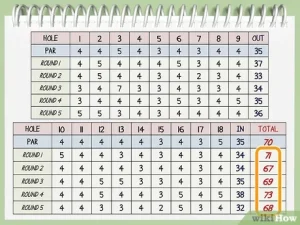Simple Golf Handicap Calculator Golf is a sport that combines physical skill, strategic thinking, and a touch of luck. For those who are passionate about the game, understanding and calculating your golf handicap is an essential part of improving your performance and enjoying the sport more fully. 
A golf handicap is a numerical measure of a golfer’s potential ability, and it allows players of varying skill levels to compete fairly. This guide will explain the basics of golf handicaps and provide a simple method to calculate your own.
Understanding Golf Handicaps
A golf handicap represents a player’s potential ability on a standard course. It is calculated based on a golfer’s recent scores, with adjustments made for the difficulty of the courses played. Handicaps enable golfers of different skill levels to compete on a level playing field by providing a means to adjust scores.
The Role of Course Rating and Slope Rating
To calculate a handicap, two important factors must be considered simple golf handicap calculator the Course Rating and the Slope Rating. The Course Rating reflects the expected score of a scratch golfer (a player with a handicap of 0) on a particular course.
The Slope Rating measures simple golf handicap calculator the relative difficulty of a course for a bogey golfer (a player with a handicap around 20 for men and 24 for women) compared to a scratch golfer. These ratings are provided by golf courses and are essential simple golf handicap calculator for accurate handicap simple golf handicap calculator calculation.
Steps to Calculate Your Golf Handicap
Step 1: Collect Your Scores
Gather your most recent scores from rounds played on different courses. You will need a minimum of five scores to calculate an initial handicap, but having more scores will provide a more accurate handicap.
Step 2: Adjust Your Scores
Adjust each score based on the Course Rating and Slope Rating of the course played. Use the following formula to calculate the Adjusted Gross Score (AGS):
- AGS=(Score−Course Rating)×113/Slope Rating
For example, if you scored 90 on a course with a Course Rating of 72 and a Slope Rating of 125, your AGS would be:
- (90−72)×113/125=16.3
Step 3: Determine Your Handicap Differentials
For each round, calculate the Handicap Differential using the AGS. The formula is:
- Handicap Differential=AGS×113/Slope Rating
Using the example above, the Handicap Differential would be:
- 16.3×113/125=14.7
Simple golf handicap calculator

Step 4: Select the Lowest Differentials
From your list of Handicap Differentials, select the lowest ones. If you have five to six scores, use the lowest one. If you have seven to eight scores, use the lowest two, and so on, according to the following table:
- 5-6 scores: use the lowest 1
- 7-8 scores: use the lowest 2
- 9-10 scores: use the lowest 3
- 11-12 scores: use the lowest 4
- 13-14 scores: use the lowest 5
- 15-16 scores: use the lowest 6
- 17 scores: use the lowest 7
- 18 scores: use the lowest 8
- 19 scores: use the lowest 9
- 20 scores: use the lowest 10
Step 5: Calculate the Average
Calculate the average of the selected lowest Handicap Differentials. For example, if you have six scores and you use the lowest one, simply use that value.
Step 6: Multiply by 0.96
To account for exceptional scores, the USGA applies a 96% multiplier to the average of the lowest differentials. This is done by multiplying the average Handicap Differential by 0.96:
- Handicap Index=Average of lowest Handicap Differentials×0.96
Example Calculation
Let’s say you have five scores with the following Handicap Differentials: 14.7, 15.2, 13.8, 16.0, and 14.1. The lowest differential is 13.8. Therefore:
- Handicap Index=13.8×0.96=13.2
- Your golf handicap would be approximately 13.2.
Knowing your golf handicap offers several benefits:
Fair Competition: Handicaps level the playing field, allowing golfers of different skill levels to compete fairly.
Goal Setting: Tracking your handicap helps you set realistic goals and measure improvement over time.
Course Selection: Understanding your handicap can help you choose courses that match your skill level, enhancing your overall simple golf handicap calculator experience.
Self-Improvement: A handicap provides insight into your strengths and weaknesses, guiding your practice and training efforts.”